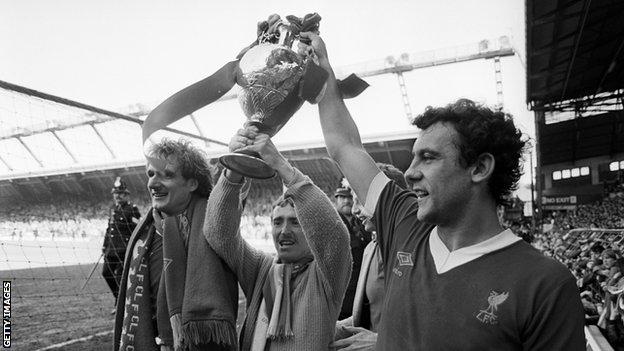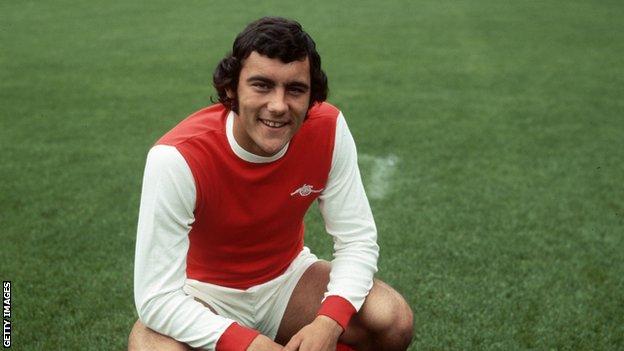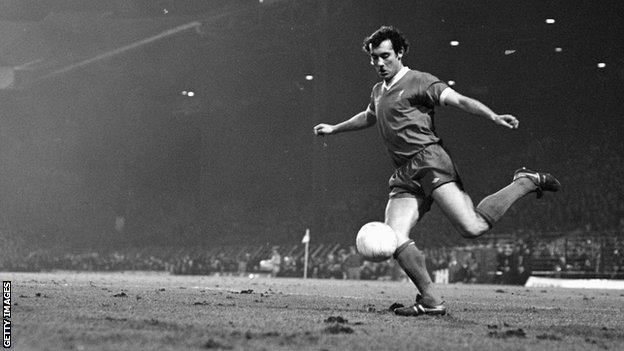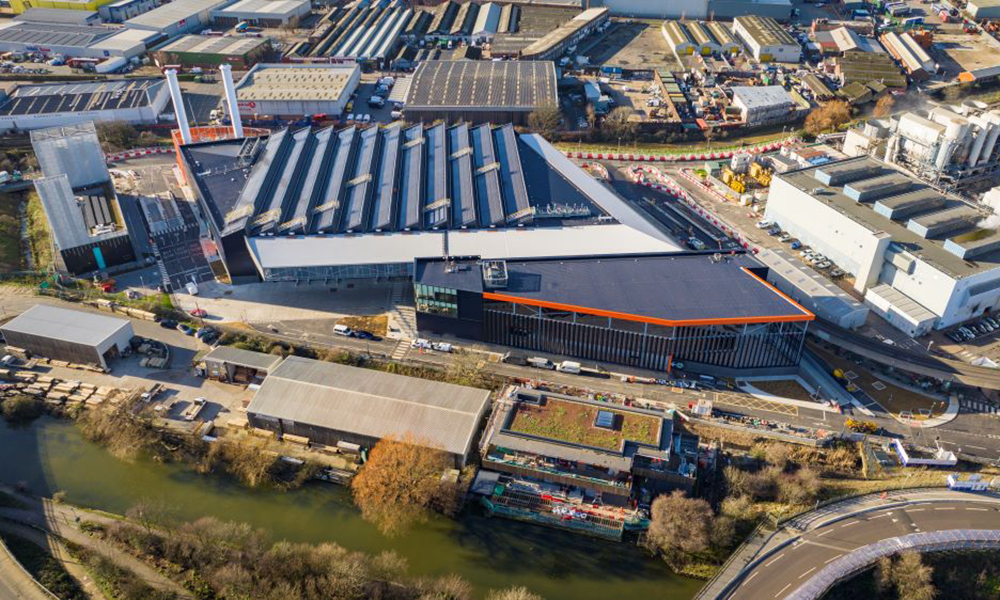
Ray Kennedy won three European Cups and five league titles during his time at Liverpool
Ray Kennedy, who has died at the age of 70, was one of the most complete and decorated footballers of his generation.
He will be remembered as a key component of Arsenal’s 1971 league and FA Cup Double-winning side before moving to Liverpool, completing a £200,000 transfer on the day legendary manager Bill Shankly resigned on 12 July 1974.
Kennedy went on to become an integral member of Bob Paisley’s all-conquering Liverpool, making 393 appearances and scoring 72 goals, winning five First Division titles, three European Cups, the Uefa Cup and League Cup before moving to Swansea City in 1982.
The Seaton Delaval-born Kennedy bounced back from an early setback, when he was released at Port Vale by Sir Stanley Matthews, to enjoy a magnificent career synonymous with success.
Kennedy, who was diagnosed with Parkinson’s disease in 1984, came to prominence as a teenager with Arsenal and played his part in the first of many triumphs when he scored a vital away goal in the first leg of the 1970 Inter Cities Fairs’ Cup, the forerunner of the Uefa Cup, against Anderlecht in Belgium.
 Kennedy spent six years at Arsenal playing as a forward before moving joining Liverpool in 1974
Kennedy spent six years at Arsenal playing as a forward before moving joining Liverpool in 1974
Arsenal lost 3-1, but Kennedy’s goal gave the Gunners the platform to win the second leg at Highbury 3-0 and take the trophy.
It was in the 1970-71 campaign, however, that Kennedy wrote his name into Arsenal folklore, forming a formidable strike partnership with John Radford.
The Gunners needed a goalless draw or win at north London derby rivals Tottenham in their final game to pip Leeds United. It was Kennedy’s powerful 87th-minute header that sent the title to Highbury. He was then in the side that beat Liverpool 2-1 after extra time in the FA Cup final at Wembley days later to seal the Double.
Kennedy did not quite build on that progress at Highbury and was only a substitute when Arsenal lost the FA Cup final to Leeds the following year.
He made that big-money move to Anfield two years later but was almost a forgotten footnote at the time because he signed on the day Shankly sent shockwaves through Anfield and the football world by quitting shortly after winning the FA Cup in 1974.
 Kennedy scored 72 goals in 393 appearances during a seven-and-a-half year spell at Liverpool
Kennedy scored 72 goals in 393 appearances during a seven-and-a-half year spell at Liverpool
If this was a changing of the guard at Anfield, what a parting gift Shankly left behind to his one-time right-hand man and successor Paisley.
Kennedy, best known as a mobile, powerful striker, struggled to make an impact in those early days at Anfield but a Paisley masterstroke transformed his fortunes and cemented his place in Liverpool history.
Paisley had noted that, apart from great physical strength, Kennedy had vision, a superb range of passing, game awareness and delicacy of touch in possession. In other words, here was a previously undiscovered midfield operator of potentially high quality.
He played in that position from November 1975 and Kennedy subsequently became a permanent fixture as Liverpool swept all before them. In 1975-76, he demonstrated the magic touch once more in a title decider, scoring the final goal in Liverpool’s 3-1 win at Wolverhampton Wanderers – a victory that meant they edged out Queens Park Rangers.
In the same season, he started Liverpool’s revival with a goal when they came from 2-0 down to beat Club Bruges 3-2 in the first leg of the Uefa Cup final at Anfield, the trophy secured with a 1-1 draw in the second leg.
Kennedy performed consummately as Liverpool won their first European Cup against Borussia Monchengladbach in Rome in 1977 before retaining it against Club Bruges at Wembley the following year.
One of his most famous Liverpool contributions came when he captained an injury-hit side away to Bayern Munich in the 1981 European Cup semi-final second leg, again showing that uncanny knack for the decisive contribution with the vital late away goal that sent Paisley’s side to Paris, where they beat Real Madrid 1-0 to win the trophy for the fourth time.
Paisley described Kennedy as “one of Liverpool’s greatest players and probably the most underrated”. The great manager also revealed that when top European clubs made enquiries for any of Liverpool’s players, Kennedy was very often the name on their lips.
Kennedy won 17 England caps under Don Revie and Ron Greenwood between 1976 and 1980, scoring three goals, but could never quite replicate his majestic and influential club form on the international stage. His final England game was a 1-0 defeat by Italy in Turin in the 1980 European Championship.
The 1981 European Cup win was his last glory at Liverpool, playing his final game for the club in December that year.
He moved to join former Liverpool team-mate John Toshack after he took Swansea City into the First Division, but his time in South Wales was chequered, even though he was appointed captain. His form went into sharp decline, later explained as the result of the early stages of Parkinson’s disease.
Kennedy returned to his native north-east in 1983 to play for Hartlepool United, a low-key end to the career of a player whose influence was so significant when Liverpool were the pre-eminent force at home and in Europe.
Liverpool and Arsenal played a testimonial in his honour at Highbury in 1991 as a fundraiser to help Kennedy while he continued to struggle with ill health.
He may have been a player who went under the radar to many outside Anfield but, within Liverpool and among his team-mates, he was always regarded as one of the classiest and most important of colleagues.


https://www.bbc.co.uk/sport/football/59481318





